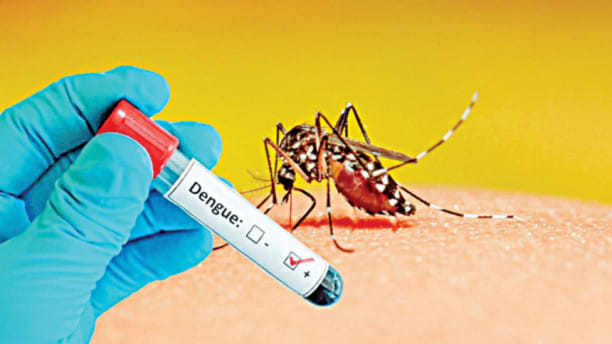Dengue on the rise: How you can stay safe

Dengue fever is once again making a strong comeback in Bangladesh. In just the first half of the year, more than ten thousand people have been hospitalised, and forty-two deaths have already been confirmed.
There are several reasons behind this recent surge. The Aedes mosquito, which spreads dengue, thrives in warm, humid conditions and breeds in stagnant water. In other words, the constant hot and humid weather we have been experiencing this year is ideal for their breeding.
Urban growth without proper planning has made things worse. In many places, garbage piles up, water accumulates in construction sites, and drainage systems fail to keep up.
At the same time, awareness and prevention efforts are not as strong. Many rural and small-town communities do not have proper mosquito control programmes or enough access to medical information. As a result, people often do not recognise early symptoms or know when to seek help.
What makes dengue so dangerous?
Dr Ashraf Ur Rahman, a Medicine Specialist and Cardiologist at the National Institute of Cardiovascular Diseases (NICVD), warns that many people confuse dengue with the common cold.
"Dengue symptoms are different. On days 1 and 2, there's high fever, but no cold," he explains. "Instead, there is extreme pain throughout the body accompanied by headaches."
He also points out that dengue mosquitoes used to bite mostly during the day, but now, people are getting bitten both day and night. "You must get rid of mosquitoes in the house or around you," he advises. "Use mosquito repellent, body creams, or sprays. Don't let water collect anywhere nearby."
According to Dr Rahman, one of the biggest dangers of dengue is how it can suddenly turn severe. "Repeated cases of dengue can lead to dengue haemorrhage," he states, "a condition where blood vessels start leaking or bleeding, which can be life-threatening."
Even more alarming is a condition called Expanded Dengue Syndrome, where the virus attacks vital organs. Doctors have seen patients whose dengue infections led to liver inflammation, brain swelling, kidney failure, or even heart problems. These cases are harder to treat and need immediate hospital care.
Hospitals feeling the pressure
As more people fall ill, hospitals are struggling to keep up. In some places, dengue wards are already full. The rising number of cases is stretching the healthcare system, especially in districts that don't have enough trained staff or equipment to handle emergencies.
The challenge is even greater for children and elderly patients, who are more vulnerable to complications. Families are being urged to seek medical help early if they notice symptoms like high fever, intense pain, vomiting, or unusual bleeding.
How you can stay safe
The most important step you can take is to prevent mosquito bites. Make sure water does not collect anywhere in or around your home. Change the water in flower vases, check air conditioner trays, and keep buckets covered.
Use mosquito nets while sleeping and apply mosquito repellents regularly. Clean your surroundings and help raise awareness in your community.
A call for early action
It's also important to act fast. If you or a loved one has a sudden high fever without cold symptoms, along with pain or fatigue, don't wait. Go to a doctor and get tested.
As Dr Ashraf Ur Rahman warns, this virus is not something to take lightly. "It's not just fever," he says. "It can turn deadly if we ignore the signs or delay treatment." Now is the time to stay alert, act early, and prevent the worst.



 For all latest news, follow The Daily Star's Google News channel.
For all latest news, follow The Daily Star's Google News channel.
Comments